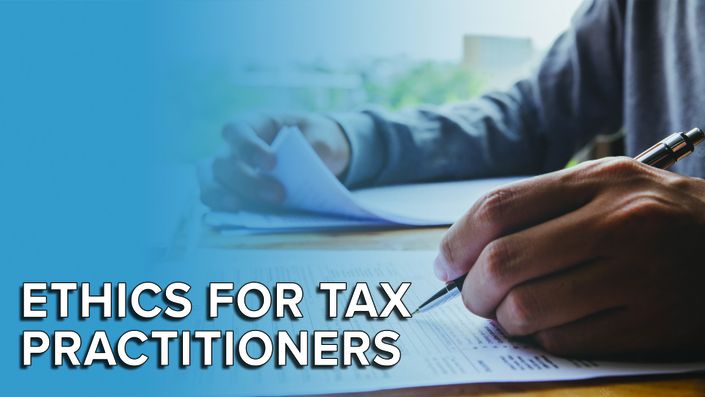
Ethics for Tax Practitioners
2-Hour Ethics Course for CPA PD Requirements - Uncomfortable but Common Ethics Tax Scenarios
Watch Promo
Have you been looking for a course to meet your CPA PD Ethics requirements that won’t put you to sleep after hitting the play button? Would you be interested in getting a couple of ethics hours yet still be provided with useful and relevant information that you can start using in your tax practice today? If so, then this is the course to help you achieve both those objectives. Meeting ethics requirements no longer has to be a necessary evil, it can be useful and practical.
This course is presented with personal and corporate tax practitioners in mind. We provide a framework for ethical tax practices by looking at the topic within the context of the CRA’s Third Party Civil Penalties and how they would approach applying these penalties.
This course, as you might expect from Canadian Tax Academy, will focus on area’s practitioners encounter in their tax practices when dealing with both clients and the CRA. It is not only a course on ethics, but also includes content on some frequently asked questions posed by new practitioners and tax preparers in the world of personal and corporate tax.
Practicing tax can be quite complex and will require the use of professional judgement on the part of the practitioner. There are many situations that will straddle the line between ethical and unethical that will be dependent on the practitioner’s course of action. This course will examine these types of situations and provide you with guidance on the course of actions to go from an unethical situation to meeting your ethical and professional requirements.
Here are a few of the ethical scenarios and we will be analyzing as part of this course:
- Situation where a practitioner uses the previous accountant’s statements and those financials were misstated
- The common scenario where a tax practitioner is at the April 30 deadline and client wants them to file without a review or signatures on the necessary documents
- What happens if a material misstatement happens if a mistake is made trying to meet a tight deadline?
- What would you do if you found an error in one of your previous year’s client returns but the CRA hasn’t caught it?
- What if your client’s tax return doesn’t make sense with the lifestyle you know they are living?
- Is it ok to declare bonuses to get the corporate profit in a corporation down to the SBD limit?
- What do you do if you know transfer payments between non-resident corporations may not be reasonable?
- Can you file GST/HST returns with estimates of input tax credits?
- Can you charge a contingency fee based on the total tax credit you achieve for the client?
These are all situations that a practitioner, experience or newbie, encounters regularly in their tax practice. Some of the scenarios we discuss might make you feel a little uncomfortable, but unfortunately they are very common occurrences. This course will make you think twice about your actions next time you encounter them.
This course provides you with 2 verifiable hours for CPA PD ethics requirement purposes. A certificate will be issued once you have watched all the videos in the course.
Your Instructor

Ian DINovo is a professional accountant and Director of the Canadian Tax Academy. He has been practicing accounting and offering independent financial and business advice for over 20 years.
He is the creator of a number of courses dealing with business, tax and investment matters that are designed to make difficult topics easy to understand for everyone.
Course Curriculum
-
StartEthics and the tax preparer - Definitions and and a scenario to illustrate (9:12)
-
StartOverview of the framework for ethical tax practices - CRA's Third Party Penalties (7:31)
-
StartExample of a common situation with CRA Collections and client balances (6:24)
-
StartCRA's Third Party Penalties as a framework and guide to study ethics (10:06)
-
StartUnderstanding the Planner vs Preparer penalty and how you can get caught under the TPP (4:39)
-
StartOur approach to anaylzing various scenarios and - approach next section (2:46)
-
StartScenario 1 - Client provides data that seems reasonable but CRA discovers it isn't (6:25)
-
StartScenario 2 - Accountant uses previous accountant statements that were misstated (6:33)
-
StartScenario 3 - The April 30 squeeze resulting in a material error on the tax return (5:38)
-
StartScenario 3a - Curveball - What if we discover an error that wasn't caught by CRA (3:13)
-
StartScenario 4 - Declaring a bonus to get the corporate profit down to the SBD limit (5:39)
-
StartScenario 4a - What if we spread the bonuses out to various family members to reduce tax? (7:26)
-
StartScenario 5 - Donations with no receipts and low income (7:48)
-
StartScenario 6 - No records and methodology on claiming GST input tax credits (6:02)
-
StartScenario 7 - Lifestyle vs reported income when filing personal returns (5:26)
-
StartScenario 8 - Transfer payments and royalties with non-resident corporations (6:11)
-
StartScenario 9 - Accountant preparing returns with tax shelter deductions and court ruling (8:00)
-
StartScenario 10 - Accountant preparing SRED claim and fee based on total tax credit (6:10)
